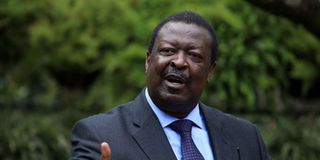Kenya in an abyss, Mudavadi says on debt burden

Amani National Congress (ANC) leader Musalia Mudavadi addresses the media at the Musalia Mudavadi Centre in Nairobi on August 23, 2020.
Politician Musalia Mudavadi says the regime that takes over from the Jubilee administration after the 2022 General Election should brace itself for the herculean task of resuscitating an economy ravaged by huge public debts.
The Amani National Congress leader is among those seeking to succeed President Uhuru Kenyatta, who is servinghis second and last five year-term.
He addressed journalists at his office on Monday, just days after Treasury Cabinet Secretary Ukur Yatani told the Finance and Planning Committee of the National Assembly that the public debt now stands at Sh7.12 trillion.
If the government’s insatiable appetite to borrow continues, it means it is likely to breach the Sh9 trillion debt ceiling enacted by Parliament last year through amendments to the Public Finance Management (National Government) Regulations.
"Terrible miscalculation"
The ANC boss said the Jubilee administration that came to power in 2013 miscalculated terribly and drove Kenyans into poverty when it went for expensive commercial loans with short repayment periods.
“We are in a crisis. The economy is not in good shape, largely due to the accumulation of huge expensive loans that must be repaid. This means the little that the government collects after taxing the over-committed Kenyans goes into debt repayment,” noted Mr Mudavadi.
The ANC boss has been consistent with his concerns for the government’s borrowing behavior since 2015, after the proceeds of the Sh250 billion Eurobond loan could not be accounted for properly.
By the time the Jubilee administration was taking over power in 2013, the country’s public debt was barely Sh1.6 trillion.
But five years down the line, the country is surging past the Sh7 trillion mark.
“What the government needed to do was to give incentives to SMEs and use agriculture to boost the economy. It failed miserably,” he said.
Top priority
Under Article 203 (1) of the constitution, public debt is the second charge on the Consolidated Fund after the national interest, followed by the needs of the national government and those of the counties among others.
This means that with the revenue the government collects through taxation and appropriation in aid among others, repayment of public debt is the second priority.
But even as Mr Mudavadi spoke, the government is still required to borrow more from the local and foreign market to finance the Sh841 billion deficit in this year’s Sh3 trillion budget.
“Wakati mkenya wa kawaida anafuliza madeni madogo madogo kushughulikia mahitaji yake kwa sababu ya uchumi dhaifu, serikali nayo inafuliza madeni makubwa makubwa ambayo yana madhara makubwa sana kwa ukuzi wa uchumi wetu,” the ANC boss said.
This loosely translates to, “when Kenyans are busy going for exploitative digital lenders because of poverty, the government is busy with commercial loans that have adverse effects on the economy.”
IMF conditions
Fears that the country may not be able to honour its repayment obligations have seen the International Monetary Fund (IMF) come up with conditions to access its accredit as well as jump-start the economy.
The conditions include undertaking retrenchment as well as freezing of employment in the public service.
“What the IMF is telling us is that you have dug a huge hole for yourselves and you may not get out of it. The only thing awaiting you is diying inside the abyss.”
Through Nambale MP Sakwa Bunyasi, Mr Mudavadi’s party has sponsored the Public Management Bill 2020, currently before the National Assembly.
The Bill seeks to regulate borrowing by creating an autonomous body - the Debt Management Authority.
Currently, the government manages its debt situation through a department at the National Treasury but which lacks the required independence to advice the government appropriately.
“The National Treasury cannot check itself. We need an independent office to advice the government properly and not the one that takes instructions from Treasury because that is clearly conflict of interest. The hope for a better Kenya lies in the proposed law,” said Mudavadi.





